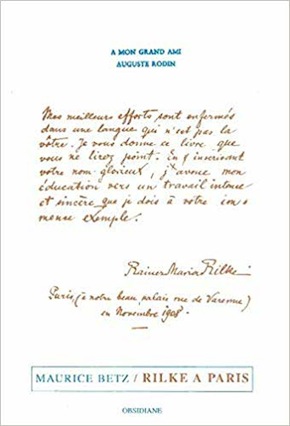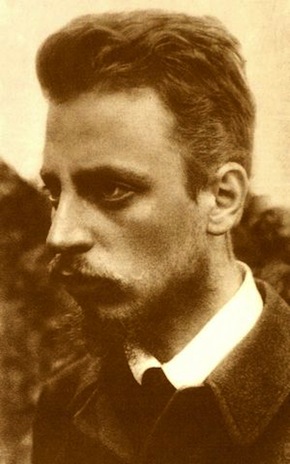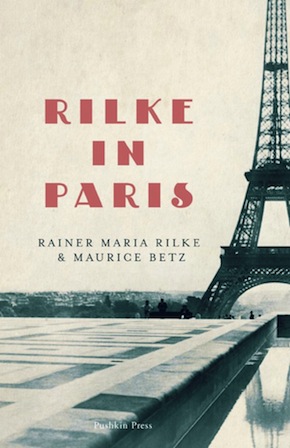More than itself
by Mika Provata-CarloneMore than a poet, Rilke, one might argue, is a supreme embodiment of a Platonic idea of the artist, a sublime abstraction of the power of art and of words to haunt us and to grant us life. Even when alive, he was less a person than he was a persona, a complex yet intangible construct of vicarious experience, palpable absence, and a very vocal silence. His name has almost become synonymous to an exclamation, a primal, yet infinitely gentrified grand pause, existentialist interjection or howl of despair and horror, of childhood terrors and the totalising fear of death, of an elegiac longing for love, for the divine as “an inclination of the soul”, for Woman as a capitalised, unattainable ideal.
Rilke’s talent or predicament was for a style that was, wittingly or not, apophthegmatic, superbly aphoristic, and for a language which is, even in German, shrouded in what his admirers have hailed as an awe-inspiring mysticism (Maurice Blanchot), and his almost equally rapt detractors as “unspeakably phoney in everything except his writing, snobbish, evasive, preachy and calculating as only the unworldly are” (Michael Wood, reviewing Ralph Freedman’s now seminal biography). Rilke belonged from the beginning in two worlds – the world of his father’s perceived inadequacy and failure, anonymity and erasure, and his mother’s Viennese realm of coveted power, public dazzle and social ambition. Proverbially penniless as only poets can be, at least in the popular imagination, he led a remarkable borrowed life of inexhaustible patronage and social, material and cultural opportunities. His effect on those who crossed his path seems to have been almost invariably messianic, eliciting the most instant and natural largesse, munificence and acceptance. Counts, princes and princesses, baronesses and wealthy merchants, grandees and grandes dames offered him their palaces, palazzi and town mansions so that, Orpheus-like, and in contented isolation, he might create both the human and the divine. Millionaire philosophers like Ludwig Wittgenstein, seeking themselves the life of the Simple Man, would sign off their inherited kroners to him (and to Loos and Kokoschka in this particular case), so that the burden of their wealth might be shed and borne more communally. Even his modest (subsidised) digs in Paris would be unvaryingly linked to Myth, capitalised, and to a more personal craving for mythmaking: his 1908 studio flat, following his stay at Baroness Nordeck zur Robenau’s Villa Discopoli on Capri, was appropriately situated in Montparnasse, or in effect, for Rilke, on Mount Parnassus.
Rilke is the epitome of the aesthetic and poetic act, of the gesture of transcendence and desolation, of a life as a constant, conscious, ever-recreated metaphor. In so many, inexpressible ways, he is the artist of the artless artifice.”
Rilke the man and the poet is the quintessence of what the French call almost untranslatably le geste. He is the epitome of the aesthetic and poetic act, of the gesture of transcendence and desolation, of a life as a constant, conscious, ever-recreated metaphor. In so many, inexpressible ways, he is the artist of the artless artifice: “I invented a new form of caress: placing a rose gently on a closed eye until its coolness can no longer be felt; only the gentle petal will continue to rest on the eyelid like sleep just before dawn,” he wrote in his diary in 1900. Roses and eyelids proliferate in his poetry, almost like the stroboscopic images in a surrealist photograph or painting: they are mystical, romantic, symbols of the inevitable ephemerality of human existence, windows to the soul or to “an inner life of visionary power,” as he wrote in 1907, or relentless, terrifying vigilanti scrutinising one’s every mortal movement and immortal thought. They both feature in Rilke’s self-chosen, carefully alliterative, monument-worthy epitaph: “Oh, Rose, thou resplendent contradiction, the lust to be the sleep of a Nobody, under the lids of so very many eyes…”
Rilke is one of the most iconic figures of late 19th- and early 20th-century European culture. So iconic perhaps, that both human image and the poetic impression often disappear behind the arguably intentional superimposed iconography and self-representation. It is this luminous space between the man and his image that Rilke in Paris was originally intended to explore, if not to fill. This slim yet compactly packed volume is an arrangement in two voices, one measured and precise, authoritative, and with a clear sense of duty towards future generations of Rilke lovers, a Pachelbelian canon full of certainty and dignified poise; the other is almost a psalm, abounding in oriental moods, dynamics and inflections, full of minor keys and ghostly harmonics. The first voice is that of Maurice Betz, Rilke’s French translator (as well as the translator of Zweig, Mann and Nietzsche), who seems to have known him –understood him – with rare sensibility and intimacy. The second voice is Rilke’s own, revived here through a minor early work, Notes on the Melody of Things, a text virtually unknown to English readers.
 Rilke in Paris was originally published in 1941, in the wake of a Rilke revival across Europe (indicatively, ten years earlier the Woolfs’ Hogarth Press had both published The Notebooks of Malte Laurids Brigge, in a translation by John Lindon, and undertaken the distribution of the Cranach Press limited edition of Vita Sackville-West’s bilingual Duineser Elegien – Elegies from the Castle of Duino). We are told by Will Stone, the translator of this English edition, that the text had lain dormant until 2000, when it was reissued in a ‘truncated’ form by Éditions Obsidiane in Paris. Betz’ intention had been to create a human foil for Rilke’s poetry, to trace a tangible trail across the poet’s life and work by fashioning an annotated, reflected guidebook through the places where he had lived, the people who had marked him, or whom he had touched in turn, the resulting writings and works. More particularly, Rilke in Paris is meant to be a testament to the centrality of Paris as a city in the cultivation, development and individuation of Rilke’s voice and poetic vision, countering the claims on the poet’s soul staked by Russia, Vienna, or perhaps Italy.
Rilke in Paris was originally published in 1941, in the wake of a Rilke revival across Europe (indicatively, ten years earlier the Woolfs’ Hogarth Press had both published The Notebooks of Malte Laurids Brigge, in a translation by John Lindon, and undertaken the distribution of the Cranach Press limited edition of Vita Sackville-West’s bilingual Duineser Elegien – Elegies from the Castle of Duino). We are told by Will Stone, the translator of this English edition, that the text had lain dormant until 2000, when it was reissued in a ‘truncated’ form by Éditions Obsidiane in Paris. Betz’ intention had been to create a human foil for Rilke’s poetry, to trace a tangible trail across the poet’s life and work by fashioning an annotated, reflected guidebook through the places where he had lived, the people who had marked him, or whom he had touched in turn, the resulting writings and works. More particularly, Rilke in Paris is meant to be a testament to the centrality of Paris as a city in the cultivation, development and individuation of Rilke’s voice and poetic vision, countering the claims on the poet’s soul staked by Russia, Vienna, or perhaps Italy.
Rilke’s Paris is contrasted with the sensual extravagances and cosmopolitan opulence of the Belle Époque, the weighted imagery of Proust’s eternal city, or the locus amoenus of the Symbolists and the Impressionists, the Decadents and any and all unclassified free spirits of that moment in time. It is a city of darkness and shadows of dejection, rather than luminescence, decline rather than triumph or modernity, a city of Nobodies, outcasts, the ailing and the dying. An urban space for the symbiosis of until then tragically estranged elements. There is both shock and tectonic friction, as well as an Aristophanic reunion of missing, errant halves. Paris for Rilke is a shrine where he yearns for a long-desired transfiguration – “in the evenings [my candles] burned as if on an altar.” It is a place of opposites and irresistible attraction, of fear, horror, poverty, an ineluctable sense of ending, that certainly reflects a heavily slanted reading of Zola, Hugo, Balzac.
If Russia provided the firmament of the divine, a parable for an authentic human society and for an osmotic proximity to nature, for the distillation of a cosmic sense of being as evinced in Rilke’s quasi-Tolstoyan The Book of Hours, Paris oscillates between good and evil, and will thematically infuse Rilke’s poetry with the glitter and oneiric qualities of Art Nouveau, the new, realist, daring existential drama of Ibsen, Stanislavski and Maeterlinck, the aesthetic rules of Ruskin and Walter Pater, and the starker, stauncher philosophy of Nietzsche. It is also a place away from Vienna and defeat, the narratives of dismay and revulsion that Rilke says marked him so profoundly, especially in their mediated, displaced reality as he experienced it, as his Lettres Milanaises so poignantly (and unsettlingly) show. Zweig and Rilke served as army bureaucrats in Vienna, while beyond their sheltered offices returning soldiers or leaked front-line accounts must have conjured up a hellish confrontation with destiny and with personal responsibility. The story of Paul Wittgenstein, pianist and brother of Ludwig, must have surely pricked their ears. This and other such stories, the mythos and hard facts of WWI would certainly provide both with ample writing inspiration. In Rilke’s hands the praxis of others and the thingness of life would be transformed into the Ding Gedicht, the ‘Thing Verse’ that could express the materiality of poetry and the poetics of mere matter: “I build objects using fear as my raw material,” as he would write to Lou Andreas-Salomé in July 1903.
Betz’ account has the qualities of a personal, if respectfully detached narrative, it is an old-fashioned, learned reminiscence that beguiles precisely for its lack of guile. It is rich, somewhat corseted, a fine ornament and commentary in the old style, full of echoes and fleeting glimpses of an era long gone by. Will Stone’s suprajacent, heavily exegetic translator’s introduction is informative, yet often laborious. Like his translation, it is surfeit with the strongest good intentions and solid erudition, yet it falls easy prey to grand, lofty stylistics and ponderous tropes. Simpler options, both in the commentary and in the translation, are too often ignored, making reading arduous, which is sad, as he offers interesting insight into the birthing process of The Notebooks of Malte Laurids Brigge and the Duino Elegies.
The sparkling miniature gem of this volume is Rilke’s Notes on the Melody of Things. Written in 1898, this sparse compendium of forty aphoristic reflections prefigures Rilke’s poetic stance in a crucial way – that of perceiving words and their meaning not simply as the echoes of an archetypal music of the celestial spheres to which the poet’s “talent takes delight”, but through an overwhelmingly fine-arts visual filter, a spectrum that ranges from the Italian Renaissance artists to Cézanne and Rodin and, through Nietzsche, back to Classical Greece. These Notes explore Rilke’s recurrent concerns regarding the present and eternity, interiority and exteriority, solitude and belonging, through a choral harmony that depends on the single voices that constitute it and vice versa. “You must extract the rhythm of the waves’ sound from the roaring tumult of the sea”, a poignant line from note XXII, might have been a favourite with Virginia Woolf.
Like Marcus Aurelius’ Meditations, Rilke’s own reflections are about retrieving first principles and the origins of things in order to achieve a perfect originality, true inspiration and meaningful innovation.”
Harold Bloom’s description of Marcel Proust as “an atheistic mystic” might well apply to Rilke here. Like Marcus Aurelius’ Meditations, which almost eerily spring to mind, Rilke’s own reflections are about retrieving first principles and the origins of things in order to achieve a perfect originality, true inspiration and meaningful innovation. At their centre is the need to reconcile individuality, the distinctiveness of the ‘I’, with cosmic unity and the oneness that Rilke desperately seeks. Evincing his deeper influences, from Virgil to Dante, Rilke moves almost breathlessly back and forth between a broader eschatological contemplation, a philosophy of being and belonging that unites mystical intuition and material praxis, and a new theory for theatrical practice and experience where the stage, like the Renaissance paintings that ought to inspire it, becomes art’s most vivid metaphor for life. “To know ‘at what moment you must make your entrance’ that is the secret of your solitude” (XVI); “Our fulfilment takes place in the luminous backgrounds” (XVIII).
Notes on the Melody of Things are essentially apocalyptic, an Orphic gesture of spirit over matter, with an incantatory power (and perhaps nebulousness) similar to Ludwig Wittgenstein’s Blue and Brown Books. They are full of oracular pronouncements that weld a religious sense of communion with the power of the artist to command both the utterable and the ineffable. “You must have forgotten the many for the sake of the more important” (XXII) – “it is almost of religious significance, this understanding” (XXXVI). Like Aristotle before him, Rilke believes that the artist’s genius (and the theatre’s effect of transcendence) lies in his ability to “become aware of [the sacred flame’s] light radiating off the faces” of those who merely stand before it uncomprehending (XXIV–V). A transcendence of borders, an ideal pan-Europeanism, is also at the heart of what Rilke himself terms his not always clear parable. In order to be one and oneself, one must be aware of and belong to the enhancing background, the broader human, historical, cultural or eschatological context, which alone grants value, essence, and the impetus to go further and beyond.
Maurice Blanchot writes in The Space of Literature that “Rilke, like Mallarmé, makes poetry a relation to absence.” In the Notes to the Melody of Things, poetry, as a metaphor for life, for true being, is defined through its ability to create a critical relationship to presence, to an immanence beyond mere individuality, or even mystical, Orphic solitude. Miniscule, incandescent, these notes echo another famous Rilke line: “as the arrow endures the bowstring’s tension, so that, / gathered in the snap of release, it can be more than itself”, they too are almost a Rilkean potentiality in waiting, of all that would follow.

Rilke in Paris is published by Pushkin Press.
Read more
@PushkinPress
Rainer Maria Rilke (1875–1926) is one of the great German writers. A master of both poetry and prose, he is best known for Duino Elegies, Sonnets to Orpheus, and The Notebooks of Malte Laurids Brigge.
Maurice Betz (1898–1946) was a writer and prolific translator of Nietzsche, Stefan Zweig and Thomas Mann. He worked closely with Rilke on the French translations of his works.
Will Stone is a writer, poet and translator of French, Belgian and German literature, living in Suffolk. He holds a degree in Literary Translation from the University of East Anglia, and has translated works by Stefan Zweig, Emile Verhaeren, Goerges Rodenbach, Maurice Maeterlinck and Joseph Roth.
willstonepoet.wordpress.com
Mika Provata-Carlone is an independent scholar, translator, editor and illustrator, and a contributing editor to Bookanista. She has a doctorate from Princeton University and lives and works in London.


